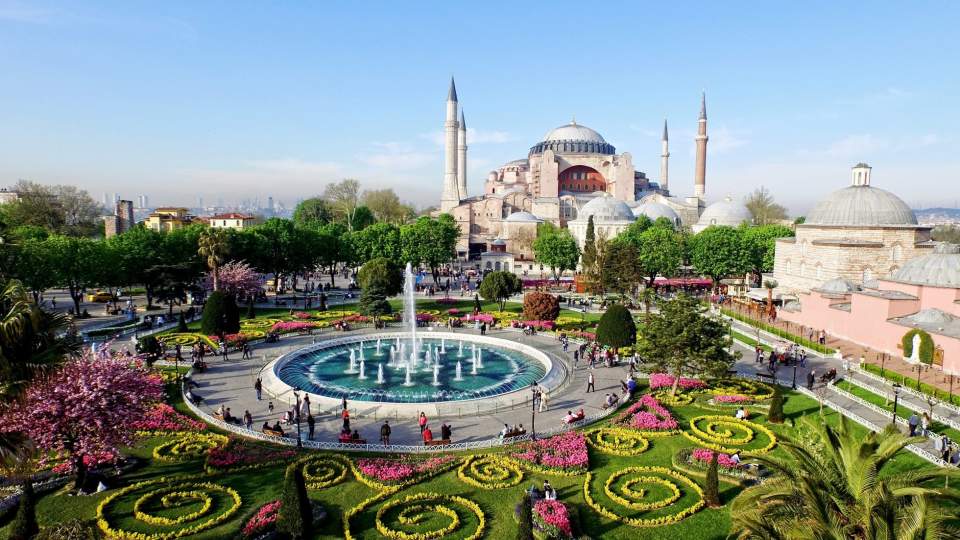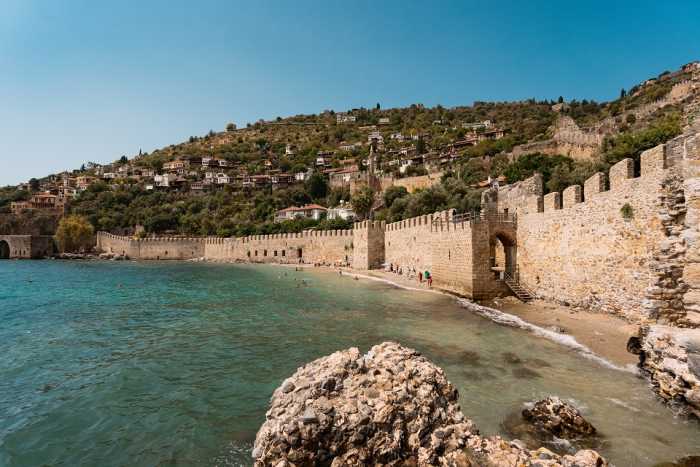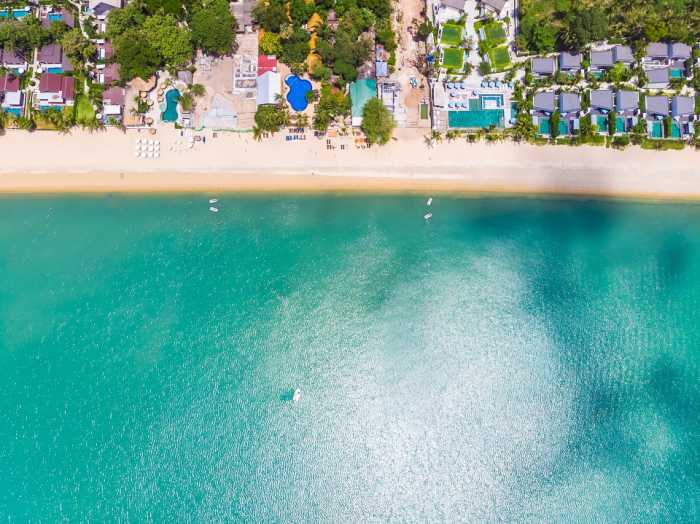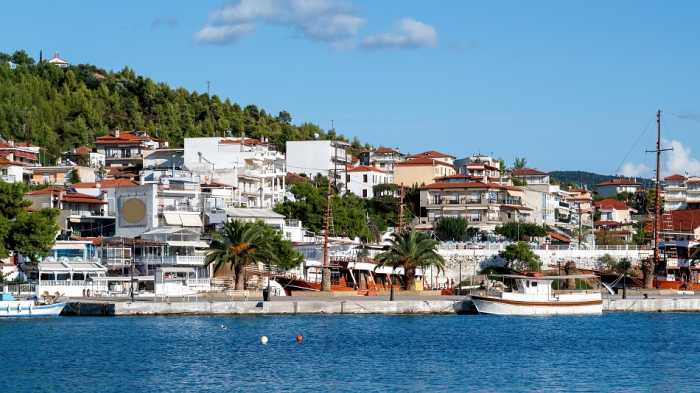Turkey offers inexpensive property on favourable terms. Every year foreigners actively buy flats and villas here. In most cases, developers sell directly, much less often buy property on the secondary market. Turkey offers high liquidity of housing, a large annual increase in prices, developed infrastructure and mild climate. Transactions happen quickly. All this makes foreign investors buy villas and apartments in Turkey.
Turkey's economy in 2024-2025
Times are tough in Turkey. In 2023, the country experienced terrible earthquakes and a difficult presidential election. In 2024, there were no such obvious shocks, but the economic situation remained tense, which affected the property market.
During the pandemic, the economy grew rapidly, but since 2022 the GDP dynamics began to decline. In 2021 it was 11.4 per cent, in 2022 it was 5.5 per cent, by the end of Q3 2024 it had fallen to 2.1 per cent.
You must have heard about the crazy inflation, which reached 85% in October 2022.
Inflation dynamics in Turkey (July 2016 - November 2024)

One of the reasons for the price growth was relatively low Central Bank rates (8.5% in mid-2023). After the elections, the Turkish Central Bank tightened its monetary policy; in March 2024, the rate rose to 50% and remained at that level until the end of the year. By the end of last year, inflation had fallen to 47%.
Change in the key rate of the Central Bank of Turkey (2020-2024)

The local currency continues to depreciate. In September 2021, 8 Turkish liras were given for a dollar, by June 2023 it was already 26. In 2024, the rate fell from 29.4 to 35.1 lira - an annual decline of about 20%.
Turkish Property Prices
Since the beginning of the pandemic, prices in Turkey have grown at the fastest rate in the world, and not only in lira. For example, by January 2023 in the local currency growth was 153%, and in locations interesting to foreigners in dollars and euros for 2022 objects rose in price by 50-70%.
In 2023, according to Endeksa, the average price of housing in Turkey increased by 84% and for the first time exceeded the mark of three million Turkish liras - then it was about $100 thousand.
However, these calculations did not take into account inflation. Last year nominal growth in local currency also continued, but real prices have already decreased. November indicators: the index of housing prices increased by 29.4% over the year, while taking into account inflation - fell by 12%.
The average price per square metre in the country by the end of 2024 will slightly exceed $1 thousand. For comparison - in August 2021 it was $522 (data of the Turkish Central Bank).
Of course, if prices are falling, they are very uneven. The most noticeable drop is in Alanya, and mainly in the secondary market. Owners who bought their homes three years ago and earlier are eager to discount: even taking into account the latest cooling, people remain in a good plus.
The most options at tempting prices appear in Avsallar and Mahmutlar. For the last three years, these neighbourhoods have been actively built up. Then because of their closure for residence permits, the demand changed, and competition between owners is great. To sell quickly, you need to reduce the price.
Secondary property is more interesting not only because of the lower price. But people who have money, prefer to buy secondary, as they see what they buy. Many objects are sold with furniture and are in good condition, so you can use them immediately. And in construction, risks have objectively increased. Most developers do not deliver their projects within the announced terms, there are also frozen projects.
Turkey's Property Demand 2024-2025
The domestic market was under pressure even before the pandemic, but the most noticeable decline started after the presidential election. But while 2023 - especially its second half - can be called a crisis year (soaring prices and rising interest rates killed demand), the market began a slow recovery in the second half of 2024. Take a look at the graph.
Number of property transactions in Turkey

In the first six months of 2024, the country sold less than in the first six months of 2023, but for the whole of 2024, the figure grew by 20.6%, primarily due to new buildings (+27%) and transactions without a mortgage (+25.9%).
The revival of domestic demand in the industry is attributed to pent-up demand and a decline in interest in deposits due to the reduction of the key rate.
Foreigners' Demand For Turkish Property
Even at the beginning of the decade, the local market was considered ‘domestic’. The share of transactions with foreigners did not exceed 5%, by the end of 2024 it fell to less than 1.5%.
Even at the beginning of the decade, the local market was considered ‘domestic’. The share of transactions with foreigners did not exceed 5 per cent; by the end of 2024 it had fallen to less than 1.5 per cent.
Rising prices - and not only for property - in dollars and euros, political instability and laws passed in 2023 making it more difficult to obtain a residence permit and rent out property, confused the newcomers. If in 2022 foreigners bought 67,490 objects, in 2023 - 35,005 (that is almost half as much). At the end of 2024, the figure will not even reach 25 thousand - a drop of about a third.
The main reason for the decline in demand is the loss of investor confidence. In 2024, there were many refusals to obtain a tourist residence permit, and after all, they affected potential property buyers. The same problem with renting: you bought an object in a construction site, and then it turned out that you cannot legally rent it for a short period of time - naturally, it is upsetting.
People don't plan to move, they don't plan to rent. They want to come to their flat in their favourite resort. In the second place in terms of popularity, I would put requests for residence permits and citizenship. Finally, the third option - investments in projects at the construction stage - this is where we are seeing a decline in interest, which is understandable.
Since the spring of 2022, the main foreign buyers of Turkish property have become Russians, but if in that year they registered more than 16 thousand transactions, then in 2024- 4 867.
Traditionally, the main demand of foreigners is concentrated in the province of Antalya and Istanbul. The third place with a big lag is held by Mersin.
Residence Permits And Turkish Citizenship
In Turkey, the investment citizenship programme continues to operate, for participation in which it is necessary to purchase - from a Turk - a residential object with a cadastral value of $400 thousand or more. The programme is in demand, and not only among the Russian-speaking audience: since 2017, it has been used by about 40 thousand applicants, bringing Turkey $15 billion.
Since autumn, the country's authorities have again made it easier to issue tourist residence permits when buying housing of any value in open areas. Still more than a thousand locations, where the share of registered foreigners exceeds 20%, are closed for obtaining a residence permit.
Investments In Real Estate In Turkey
High market volatility has cooled the ardour of investors. They were even more affected by the law that will come into effect in 2024, which makes short-term rentals more difficult. Now it is possible only with the consent of all tenants of a particular building.
However, many complexes in 2024 went the other way - changed the statute, allowing ‘short-term’. This requires the consent of 85 per cent of tenants. ‘This is not too costly solution, - comments Alexandra Kabakchi. - I think that by the summer season - 2025 in the same Alanya dozens of projects will again be suitable for short-term rentals. Plus the number of inspections has also decreased compared to the beginning of 2024, when the new law came into force’.
According to Global Property Guide, the average yield in mid-2024 is 7.13 per cent before maintenance costs and taxes.
- Istanbul has 6.63%;
- Ankara 8.19%;
- Antalya 5.1%;
- Izmir 7.22%.
The province with the highest rent was Istanbul.
Turkey's Property Market In 2025: Outlook
According to a statement from the Turkish Statistical Institute (TÜİK), the economy's dynamics ‘reflects balanced progress that is in line with expectations based on the ongoing disinflation policy’.
The regulator's forecasts are optimistic, with GDP growth of 4 per cent and 4.5 per cent in 2025 and 2026 respectively.
Analysts expect the shift towards higher housing costs to start by April and accelerate by mid-2025. One of the main drivers of positive dynamics will be the recovery of buyer activity: in the first half of 2025, mortgage rates are expected to fall significantly, which will lead to an increase in both demand and property prices. This will act as a stimulus to local enquiries.
Over the last two months, the activity of foreign buyers has also started to grow, and this trend will only strengthen with the start of the high season.
The period of lower prices and favourable discounts on the market will continue for two or three more months, and in spring, with the arrival of the season, the situation will change. Prices will start to rise, which means that there will be no more options with such attractive prices and discounts.





